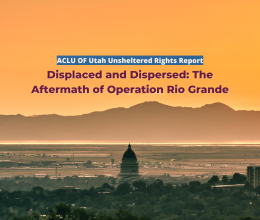
On May 15, analysts from the Pew Public Safety Performance Project made the first in a series of presentations about Utah’s criminal justice system. As part of a Justice Reinvestment process that Pew is undertaking with state leadership, this presentation offered information about specific “drivers” of Utah’s growing prison population. The information was derived from data obtained from the Department of Corrections and the state courts, then analyzed by Pew.
This blog post is meant to be a quick recap of the Pew presentation, with a few thoughts from the ACLU of Utah thrown in! You can read the full presentation for yourself and draw your own conclusions: it is available for download at the bottom of this page.
While Utah does not incarcerate as much, per capita, as most other states, we are nonetheless bucking an important and positive national trend of prison de-population. Our state prison population grew 22% in the last decade, and is still going up. Nationally, prison and jail populations peaked in 2007, and have been declining since.
The ACLU of Utah also likes to remind our fellow Utahns that while our rate of incarceration is relatively low, it is still inexcusably high by historical standards. Since 1980, Utah’s population has not quite doubled – it has grown by about a factor of 1.95. During that same time, Utah’s prison population (not including individuals on probation or parole) has increased by a factor of more than 7.
According to Pew, Utah’s prison population growth cannot be explained by population growth (which grew by 19% since 2004), nor an increase in crime (with 14% fewer crimes reported in Utah during that time). Something else is clogging the system.
Strangely, Utah’s overall prison admissions are in decline. This includes all people going to prison for a new crime, a parole violation or a probation violation (note: 43% offenders admitted to prison have no new criminal conviction – they are going to prison due to revocation of parole or probation).
How can Utah’s prison population be growing, if the rate of people entering prison is dropping? Because prisoners are staying incarcerated longer. Since 2004, there’s been a 20% growth in the amount of time served. While the flow of people into prison has slowed somewhat, people are coming out at just a trickle – hence, our prison population is swelling like a clogged pipe. That is one major reason that the state legislature recently appropriated money to expand the prison facility in Gunnison.
Pew also shared that 63% of new court commitments to prison are for non-violent crimes (mostly second- and third-degree felonies). Possession of a controlled substance is still the most common crime at admission.
As is true nationwide, Utah’s population of prisoners older than age 55 is growing. This group has more than doubled in size since 2004. Elderly prisoners have unique – and often expensive – medical issues; we can expect greater costs associated with this group in decades ahead.
This first report from Pew also confirms what we already know: Utah has an unusually high population of inmates who have been convicted of sex offenses. Nearly one-third (31%) of all state prisoners are serving time for a sex offense; research by the ACLU’s Over-Incarceration Project indicates that in most states, people convicted of a sex offense comprise 10-15% of the total prison population (several other Western states, including Nevada and Idaho, are above average as well, but not as high as Utah). And not only is this population high, it is growing. There are 42% more of these individuals behind bars now than there were in 2004.
So far, neither Pew nor the Commission on Criminal and Juvenile Justice (CCJJ) have any concrete explanations for why these factors are driving our prison population. We only know that they are. We have some theories – we’ll share those thoughts with you in the weeks ahead!
Pew’s presentations to CCJJ are open to the public. Click here for a schedule of upcoming meetings.
For more information about the ACLU of Utah's involvement in Utah's Justice Reinvestment process, please contact Anna Brower, Public Policy Advocate, at [email protected].





